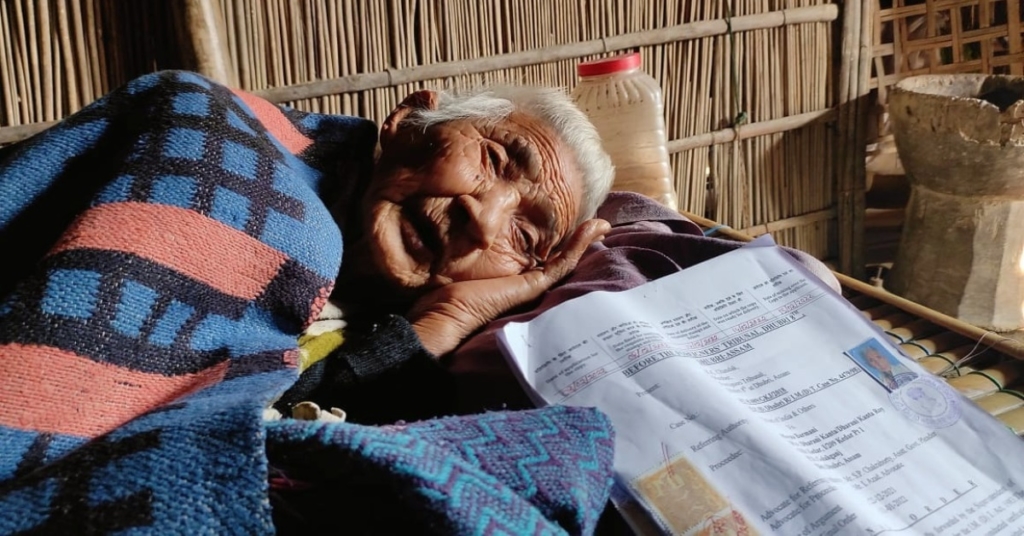
No cage for this Moyna! CJP helps nonagenarian Rajbongshi woman defend her Indian citizenship in Assam
18, Feb 2022 | CJP Team
In June 2021, we brought you the story of Moyna Barman, a Koch Rajbongshi woman in her 90s, who was being forced to defend her Indian citizenship. But the frail yet feisty woman did not give up, and now with CJP’s help, after eight months of a persistent legal campaign, she has been declared Indian!
When the CJP team met her the first time, she had sworn, “I will not die until I clear my name and have this dark spot of being a ‘foreigner’ removed from my head!” Her persistence paid, and she finally got a judgment in her favour. But as her health deteriorated – she can barely get out of bed now and survives only on biscuits – her anger at the whole unnecessary ordeal is still palpable.
When the CJP team finally delivered her a judgment copy, she said, “What shall I do with this now? Do I have time for this now? Tell them to take it away and let me die in peace!”
Every day of each week, a formidable team of community volunteers, district volunteer motivators and lawyers—CJP’s Team Assam – is providing ready at hand paralegal guidance, counselling and actual legal aid to hundreds of individuals and families paralysed by the citizenship-driven humanitarian crisis in the state. Our boots on the ground approach has ensured that 12,00,000 persons filled their forms to enlist in the NRC (2017-2019) and over the past one year alone we have helped release 52 persons from Assam’s dreaded detention camps. Our intrepid team provides paralegal assistance to, on an average of 72-96 families each month. Our district-level, legal team works on 25 Foreigner Tribunal cases month on month. This ground level data ensures informed interventions by CJP in our Constitutional Courts, the Guwahati High Court and the Supreme Court. Such work is possible because of you, individuals all over India, who believe in this work. Our maxim, Equal Rights for All. #HelpCJPHelpAssam. Donate NOW!
Brief background of the case
Moyna was born in the Maitel village in an area adjacent to the Bangladesh border. She was married off very early in life and moved to her husband’s home in Kedar (part i) village in Dhubri district where they had three children, a son and two daughters. After her son’s death a few years ago, Moyna started living with one of her daughters, who had moved after marriage to the neighbouring Kedar (part iii) village. It falls under the jurisdiction of the Golakganj police station and is located in the Gauripur Legislative Assembly Council in Dhubri district.
Moyna was named a doubtful voter (D Voter) in 2007, and was served a Foreigner Notice from Dhubri Foreigners Tribunal in 2018, FT case no -8/489/GKJ/2018 under Dhubri FT-8 at Dhubri District, Assam. (S.P.(B) Dhubri R/I.M.(D).T. case no. 4479/98).
“I first heard of Bangladesh in 1971,” she had told our team when we first met her, adding, “I had voted in Naliya in 1966 and Dimapuri after that.” She was unable to understand her predicament then and even now, wonder why this came to be the way they did.
Challenges in the case
But what complicated matters a bit was that from day one Moyna refused to go before court to prove her citizenship. She felt it was an affront to be even asked to do so. That is why, they advocate her family had initially hired, and who the CJP team was assisting, eventually backed out.
The CJP team immediately rushed to her home and tried to convince her, but she was understandably enraged and asked, “How could someone define me whether I’m an Indian or not, when I have seen the freedom struggle and the partition and so on?” Though it was hard to convince someone of such an advanced age, we just couldn’t let it go. Eventually, we were able to convince her to go just once.
Then the CJP legal member of Dhubri district started looking into the case and appeared in court. This encouraged the previous advocate to come back and we discussed the case in detail. CJP’s Dhubri District Volunteer Motivator (DVM) provided him constant support.
Another challenge was taking Moyna to court at her age, and especially in her condition, she needed to go to a hospital, not a court or Foreigners’ Tribunal. We made transportation arrangements keeping all this in mind.
On the day of hearing, the tribunal member asked her many questions despite her health condition, but Moyna’s response was polite and simple, “Baba….Amra ai Desh’r a Manush Baba, Amra Bharatiyo.” (Translation: Son, we are the people of this country, we are Indian.)
CJP also helped her submit documentary evidence such as a copy of her name in the 1951 National Register of Citizens (NRC), certified copy of the electoral rolls from 1966, 1970, 1977 and 1985 bearing her name, land ownership documents etc.
And after this struggle, she was finally declared Indian, and on February 16, 2022, CJP Assam State Team In-charge Nanda Ghosh, DVM Habibul Bepari, CJP legal team member Advocate IskandarAzad and community volunteer Illias Rahaman, visited the feisty nonagenarian and handed over the judgement copy.
A copy of the judgment may be read here:
“This case was nothing sort of historic, a milestone for CJP,” said Ghosh. “I shudder at the thought of what would have happened if the team had not arrived on time to help Moyna Barman. She could have got ex parte judgement by the FT and would have been declared foreigner. And what after that? Would she have been sent to a detention camp at this stage of her life?”
Overcoming trauma amidst unanswered questions
Moyna’s daughter, Dhabli Bala Barman, has been looking after her elderly mother and after the judgment, is now relieved, even happy that the family’s ordeal is now over. “I can’t tell you how happy I am today. I don’t know how to thank these brothers(the CJP team). Without them I can’t even dream to remove the foreigners tag, my mother would have died as being dubbed a foreigner.”
But even Dhabli Bala has questions that need answers. She asks, “On the one hand, the government itself says that Rajbongshi community is an ethnic group of Assam, and on the other, my mother was served notice that we are foreigners. What it is?”
The FT case had other kinds of consequences as well. “Economically, we are very backward, and at amidst all this, especially at this stage, my mother was deprived of elderly pension because of the FT case. We were totally cut off from any government scheme,” said Dhabli Bala, asking, “Even now, every month, we need expenses minimum one thousand rupees to take medicine for my mother. It is difficult for a poor family like us. What is government doing?”
Just as we were about to leave, Moyna who had been unable to leave the bed spoke in her mother tongue Rajbongshi , “Tomra jan naki baba! Geile toh r buji aspen na baba!” (Translation: Sons, you are all going. If you go, you will not come back again.) This caused us all to choke a bit. She had heard our conversation outside – that we were leaving – and expressed her disapproval, even though we were going to become a distant memory to her soon.
Related:
Beauty and the bumbling Beast of Bureaucracy
ASLSA indicates shortage of funds for providing legal aid to those excluded from NRC
CJP strengthens commitment to our fellow Indians in Assam in 2021









